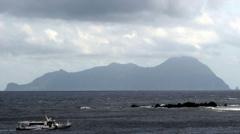The Wonsan Kalma resort, heralded as a cultural destination by Kim Jong Un, faces scrutiny for alleged labor abuses.
**North Korea's New Resort Begins Welcoming Russian Guests Amid Controversy**

**North Korea's New Resort Begins Welcoming Russian Guests Amid Controversy**
New beach resort in North Korea attracts tourists as concerns over human rights emerge.
A recently inaugurated beach resort in North Korea, the Wonsan Kalma, has officially welcomed its inaugural group of Russian tourists this week, igniting numerous discussions around its controversial origins and the treatment of its construction workforce. The lavish resort was presented to the world last month by North Korean leader Kim Jong Un, who proclaimed it a "world-class tourist and cultural destination."
Details behind the construction of this much-anticipated resort remain obscured, reflective of the country's tightly controlled information environment. Investigative efforts by the BBC Verify team, including satellite imagery, insider testimonies, and planning documents, have unearthed serious allegations of human rights violations tied to the labor practices employed during its development.
The resort mirrors the popular destinations of Spain's Benidorm, a fact reinforced by Kim's personal ties to the area; he spent considerable time vacationing in Wonsan during his youth. Plans for the Wonsan area originally aimed to attract nearly one million visitors while maintaining a strictly regulated entry regime. According to Ri Jong Ho, a former North Korean economic official, the intent was to partially open the country to tourism.
The inspiration drawn from Benidorm emerged during a North Korean delegation’s visit to Spain in 2017, where they meticulously studied the successful tourist operations. Outcomes of this research can be seen in the development plans, which include 43 planned hotels, a water park, entertainment complexes, and various leisure facilities, built rapidly along the coastline.
Despite the rapid construction evident in satellite imagery from preceding years—whereby around 80% of the resort appeared to reach completion by late 2018—issues of labor exploitation have surfaced. The UN has spotlighted North Korea's employment of forced labor, particularly through so-called "shock brigades." The working conditions reported by former workers describe grievous hardships, long hours, minimal pay, and even fatalities on the job site.
Reports recount harrowing experiences, such as those voiced by defectors who have claimed their relatives endured extreme exhaustion and malnourishment while striving to meet construction deadlines. Witness accounts reveal that local residents faced displacement as the resort's expansion encroached on their homes, often without compensation.
As North Korea opens its doors to Russian tourists—who can purchase trips priced significantly above the average salary in Russia—questions regarding the potential tourist draw to Wonsan Kalma arise. Experts suggest that this resort may struggle to compete with more established, popular travel destinations. Early responses from Russian travel agencies indicate limited interest, with only a handful of travelers signed up for structured tours thus far.
Wonsan Kalma not only symbolizes a significant move for North Korea's tourism ambitions amidst economic pressures but also represents a strengthening alliance with Russia, particularly in light of evolving geopolitical landscapes. However, concerns remain about the fate of its construction workers and the treatment of the local populace as international attention focuses on this budding resort within the hermit kingdom.



















